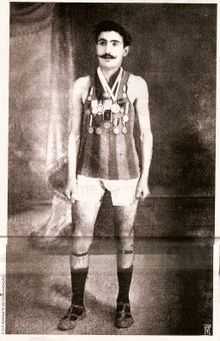Francisco Lázaro

1891–1912
Like all the Olympic athletes of his time, Lázaro was an amateur sportsman, and his actual job was as a carpenter in an automobile factory in Lisbon.[4] Prior to the Olympics he had run and won three national marathon championships in his native country.[5]
Lázaro was the first athlete to die during an Olympic event, after collapsing at the 30 kilometer mark of the marathon. The cause of death was thought to be severe dehydration due to the high temperature registered at the time of the race; later it was discovered Lázaro covered large portions of his body with wax to prevent sunburns, but eventually the wax impermeability restricted the athlete's natural perspiration, leading to a serious body fluid electrolytic imbalance.[6]
The novel The Piano Cemetery by Portuguese novelist José Luís Peixoto is based on Francisco Lázaro's story.
References
- ↑ Francisco Lazaro, Portuguese runner January 21 in History at www.brainyhistory.com
- ↑ Francisco Lazaro, Portuguese marathon runner (Olympics), dies at July 21, 15 in History at www.brainyhistory.com
- ↑ Pires, Gustavo. "Francisco Lázaro, a emborcação no treino" (in Portuguese). Fórum Olímpico de Portugal. Retrieved July 7, 2008.
- ↑ Pires, Gustavo. "Francisco Lázaro, a emborcação no treino" (in Portuguese). Fórum Olímpico de Portugal. Retrieved July 7, 2008.
- ↑ Rosen, Daniel M. (2008) Dope: a history of performance enhancement in sports from the nineteenth century to today. Praeguer Publishers, Westport, CT, United States
- ↑ Pires, Gustavo. "Francisco Lázaro, a emborcação no treino" (in Portuguese). Fórum Olímpico de Portugal. Retrieved July 7, 2008.